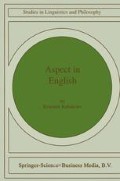Abstract
The main purpose of this work has so far been to describe aspect in English in terms of a contrast between perfectivity (boundedness) and imperfectivity (non-boundedness), understood as a universal distinction that can also be found in other languages or even, most probably, in all natural languages. The idea of viewing aspect as a perfective/imperfective contrast expressed in various overt or covert ways has been prevalent in many studies of aspect. However, the notions of perfectivity and imperfectivity (boundedness and non-boundedness), if they can serve as basic tools for the analysis of aspect in most general terms and for a broad description of the aspect mechanisms found across languages, prove insufficient in an attempt at a more comprehensive and precise analysis of the semantics of all kinds of sentences and situations denoted by them. According to Vendler’s classification and similar descriptions, which establish four different situations, not a single distinction, imperfectivity/non-boundedness is conceptualised as two major kinds: activities and states. These two situations are widely recognised as necessary and valid separate characterisations of the semantics of sentences. But, on the one hand, the need for making a distinction between accomplishments and achievements as perfective actions/situations has often been challenged by aspectologists: as already shown earlier, it is often difficult to tell whether a perfective action takes place as a more or less momentary transition from one state into another or as a time-consuming event.
Access this chapter
Tax calculation will be finalised at checkout
Purchases are for personal use only
Preview
Unable to display preview. Download preview PDF.
References
It was Sheila Glasbey (personal communication) who found sentence (262c) odd and suggested the change from (262c) to (262d) for the purposes of the discussion. In her opinion, a sentence like (262d) is perfectly acceptable for the following reason: a fence is bigger than a table and can easily be thought of as taking more time to paint.
On the contrary, sentence (268b) is more perfective than (268a) — probably because of the singular form a meeting which emphasises the singularity of the event. But, on the other hand, both sentences (268a) and (268b) explicate perfectivity in contradiction with Verkuyl’s perfective schema. The reason for this can be explained in pragmatic terms. See Chapter Fourteen. On ‘knowledge of the world’ in the explication of aspect in English.
Galton does not expressly assign the pofective to time adverbials of the for an hour type — which, as already argued extensively in this book, are of extreme importance for the description of the overall system of aspect in English.
As already mentioned, apart from Galton (1984), whose position has already been considered, other authors, like Mellor (1995) and Binnick (1991), have discussed certain features of what is here referred to as an episode, without establishing a separate situational class. Langacker (1987/1991) actually uses the term ‘episode’ in an aspectological framework, but with a rather different meaning. He assumes that sentences like A statue of George Lakoff is standing in the plaza or This machine is lacking a control lever portray the situation as “constituting a bounded episode” (Langacker (1991: 94) — a view which is incompatible with the present approach.
Although, as already argued, for-time adverbials are different (e.g. the for-an-hour type is different from the for-hours type), by a for-time adverbial here a for-an-hour type is meant, unless stated otherwise.
The inherent endpoint of an action has so far been associated with a pragmatically identifiable result of the action. Though the latter is a rather vague notion, it seems to be relevant to the description of situations. However, a pragmatically identifiable result of the action could be found in episodes as well. Compare the episode / ate well and the accomplishment / ate myself full. At first sight, it can be maintained that the result of my being not hungry any more is identifiable in the meaning of both sentences. Compare also the two Bulgarian sentences below which are conceived of as entirely equivalent semantically. An imperfective Aorist verb form (i.e., an episode) is used in the first, a perfective Aorist (i.e., an accomplishment) in the second:
In the classification of situations in English proposed in this chapter there is no correspondence for the situational meaning denoted by the perfective Imperfect in Bulgarian. This is because Vendler’s classification and similar descriptions, including the classification proposed here, cover the major possible situational meanings only. Out of the combination between, e.g., a state or an activity or an accomplishment, etc., on the one hand, and another aspectual value, like, e.g. bounded repetition or non-bounded repetition, etc., on the other hand, some other, secondary, aspectual (situational) values are derived. The present work needs to focus on the major situational values. Further research will be needed for an exhaustive description of all possible aspectual (situational) values valid and appropriate for a particular language like English or for language in general.
Note that the state meaning is represented as a non-bounded iterative, because the nature of read the letter is such that it requires non-bounded iterativity in order to be understood as a state. Also, the separate actions of reading the letter are represented as non-bounded, but they could be bounded as well (for detail, see Chapter Five, Extension in time of subjects and objects from a “common-sense” point of view or Chapter Eleven, The impact of adverbials in the sentence, and aspect in English).
Author information
Authors and Affiliations
Rights and permissions
Copyright information
© 2000 Springer Science+Business Media Dordrecht
About this chapter
Cite this chapter
Kabakčiev, K. (2000). On Aspectual Classes in English. In: Aspect in English. Studies in Linguistics and Philosophy, vol 75. Springer, Dordrecht. https://doi.org/10.1007/978-94-015-9355-7_13
Download citation
DOI: https://doi.org/10.1007/978-94-015-9355-7_13
Publisher Name: Springer, Dordrecht
Print ISBN: 978-90-481-5548-4
Online ISBN: 978-94-015-9355-7
eBook Packages: Springer Book Archive

